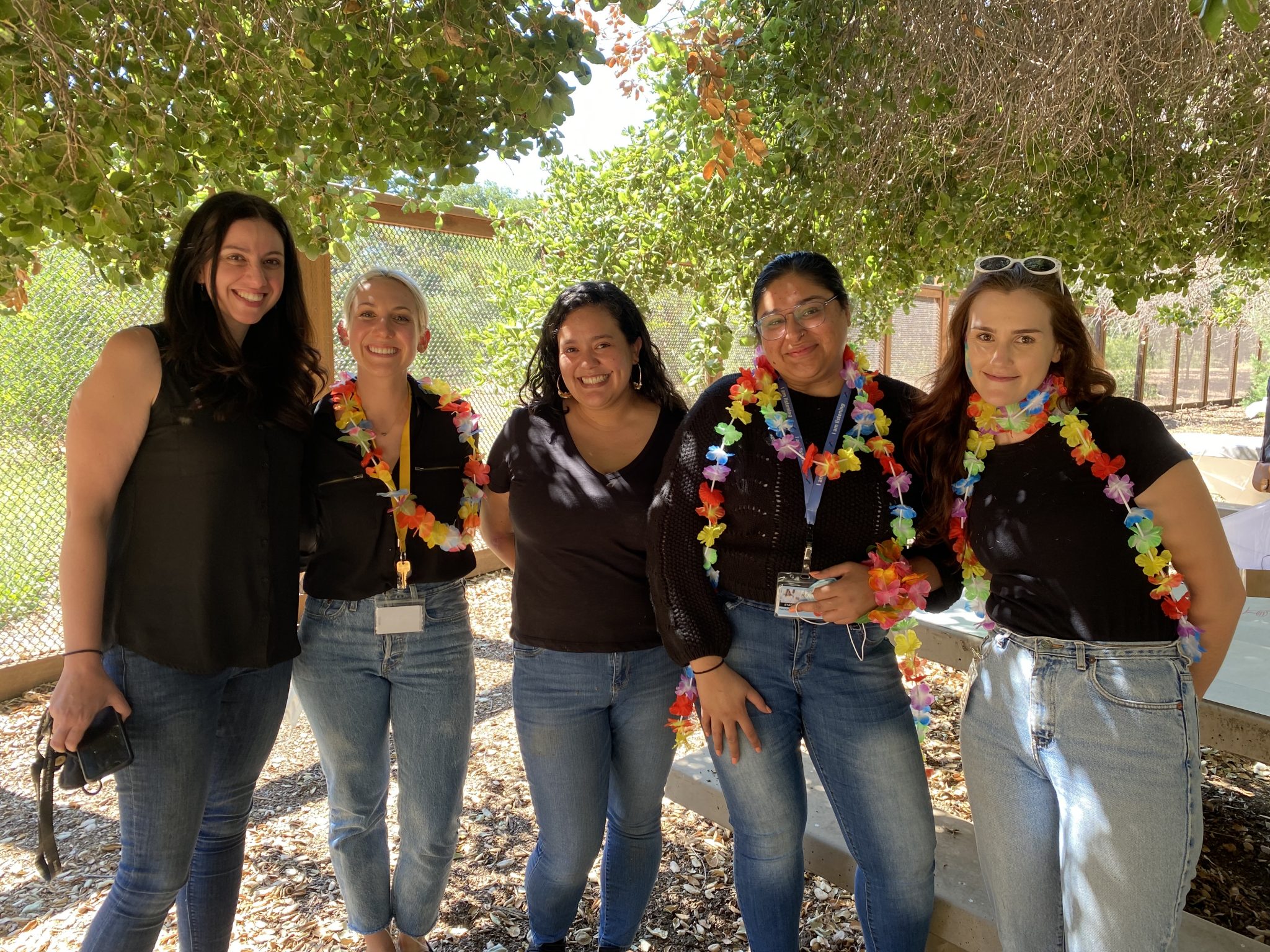28 Jul Why We Serve — Minority Mental Health Awareness

Photo of Dr. Martha Hernández (far left) with our team of Family Support Services trainees.
As associate director of Family Support Services (FSS) at Ronald McDonald House Charities Bay Area (RMHC Bay Area), Dr. Martha Hernández plays an integral role in supporting the wellbeing of Ronald McDonald House families as they cope with the emotional and financial burden of their children’s medical crises and hospital stays.
She trains and supervises a team of graduate students, who provide culturally appropriate psychosocial support to families, including individual sessions, family sessions, group support, parent workshops, and Fun Clubs aimed at helping children and families cope with stress through play. (Learn how Dr. Hernández and the FSS team have adapted to the pandemic with virtual services). In collaboration with FSS counterparts in Southern California, Dr. Hernández supports three additional Ronald McDonald Houses in Los Angeles, Pasadena, and the Inland Empire. Under Dr. Hernández’s direction, FSS offers bilingual graduate students distinctive Spanish-language training and integrates social justice into the program’s training and service delivery frameworks.
 Dr. Hernández says she is realizing a lifelong goal: providing her students with culturally responsive and linguistically appropriate training to meet the needs of Spanish-speaking families, which is especially crucial considering 50 percent of families across the Bay Area and Southern California sites are monolingual Spanish speakers. The impact of her work extends far beyond the walls of RMHC Bay Area. As a member and soon-to-be president-elect of The Society for Couple and Family Psychology, Division 43 of the American Psychological Association (APA), Dr. Hernández dedicates much of her time and effort to gaining a deeper understanding of the mental health needs of immigrants. She recently played a key role in the development of a report titled “Protecting Immigrants From Harm: Collaborative Advocacy Strategies for Mental Health Professionals and Community Activists.” Prepared by eight APA Divisions and the National Latinx Psychological Association (NLPA) in collaboration with immigration activists across the 5 regions of the US, the report highlights how to best serve immigrants and the activists supporting them. As Minority Mental Health Awareness Month comes to a close, we asked Dr. Hernández to share why this work is critical today.
Dr. Hernández says she is realizing a lifelong goal: providing her students with culturally responsive and linguistically appropriate training to meet the needs of Spanish-speaking families, which is especially crucial considering 50 percent of families across the Bay Area and Southern California sites are monolingual Spanish speakers. The impact of her work extends far beyond the walls of RMHC Bay Area. As a member and soon-to-be president-elect of The Society for Couple and Family Psychology, Division 43 of the American Psychological Association (APA), Dr. Hernández dedicates much of her time and effort to gaining a deeper understanding of the mental health needs of immigrants. She recently played a key role in the development of a report titled “Protecting Immigrants From Harm: Collaborative Advocacy Strategies for Mental Health Professionals and Community Activists.” Prepared by eight APA Divisions and the National Latinx Psychological Association (NLPA) in collaboration with immigration activists across the 5 regions of the US, the report highlights how to best serve immigrants and the activists supporting them. As Minority Mental Health Awareness Month comes to a close, we asked Dr. Hernández to share why this work is critical today.
Q: How does your work with RMHC Bay Area families inspire and/or inform your work on projects like this?
RMHC Bay Area has a large population of newly arrived and some long-standing immigrants staying with us. It helps me prepare myself, learn how best to serve them, and ensure I meet them with cultural humility.
Q: How does this report reflect the importance of highlighting Minority Mental Health Awareness Month?
Discrimination and racism have been shown to impact one’s physical and emotional well-being, which can be compounded if someone has experienced any traumas and discrimination in their country of origin. Therefore, immigrants are a very vulnerable population with multiple minority statuses. Immigrants face discrimination at high rates and are targeted not only by political laws and policies, but also by people in the community. This report helps highlight the mental health needs of immigrants and how to best serve them and the activists supporting them in the community.
Q: Why are publications like these important?
Immigrants might be mistrusting of those in authority based on their previous experiences. This type of publication allows mental health providers to understand a different perspective. Immigrants have diverse cultural backgrounds and experiences that mental health professionals do not always understand or have the education to work with; there are different physical and emotional needs that immigrants may require. Mental health providers are not always taught to be activists or involved in politics despite how much of mental health problems many times are intertwined with structural racism. This publication specifically is based on grassroots work; therefore, it involved collaborating with activists who are working firsthand with immigrants and fighting policies that impact immigrants. This type of work builds unity and collaboration with community organizations, which is needed to be more effective and meet immigrants where they are.
Q: What do you hope the impact of this publication will be?
I hope that that this publication encourages mental health providers to work within different systems and not just individually or in isolation. I also hope it informs how to support communities working with immigrants, and that it provides psychoeducation to the experiences that activists and immigrants are facing. Additionally, I hope this publication sheds light on the inhuman experiences that immigrants face, the policies that make it impossible for adequate care and equality in the U.S., as well the impact of structural racism on immigrants. I hope it informs further policy changes and that mental health providers begin advocating beyond the individual in front of them.
Q: Who is the target audience for this report?
This report is intended for mental health providers primarily; however, it can benefit anyone who wants equality and equity for others. It sheds light on the need for basic human rights that immigrants don’t always have.
Q: What inspired you to get involved?
As a regional leader, I participated in writing the grant and helped others in ensuring we were able to interview activists from the western region of the U.S., with at least 1-2 activists per state.
Q: How did this group come together?
The APA funds what is called, “a Committee on Division/APA Relations (CODAPAR) grant,” which allows for different divisions of APA to work together on a project. This specific project was built off a separate project.
Want to learn more about inequities in mental health care? Check out Dr. Hernández’s recommended resources:

Photo of Dr. Martha Hernández (far left) with some of her Family Support Services (FSS) trainees.
As associate director of Family Support Services (FSS) at Ronald McDonald House Charities Bay Area (RMHC Bay Area), Dr. Martha Hernández plays an integral role in supporting the wellbeing of Ronald McDonald House families as they cope with the emotional and financial burden of their children’s medical crises and hospital stays.
She trains and supervises a team of graduate students, who provide culturally appropriate psychosocial support to families, including individual sessions, family sessions, group support, parent workshops, and Fun Clubs aimed at helping children and families cope with stress through play. (Learn how Dr. . In collaboration with FSS counterparts in Southern California, Dr. Hernández supports three additional Ronald McDonald Houses in Los Angeles, Pasadena, and the Inland Empire. Under Dr. Hernández’s direction, FSS offers bilingual graduate students distinctive Spanish-language training and integrates social justice into the program’s training and service delivery frameworks.
Dr. Hernández says she is realizing a lifelong goal: providing her students with culturally responsive and linguistically appropriate training to meet the needs of Spanish-speaking families, which is especially crucial considering 50 percent of families across the Bay Area and Southern California sites are monolingual Spanish speakers. The impact of her work extends far beyond the walls of RMHC Bay Area. As a member and soon-to-be president-elect of The Society for Couple and Family Psychology, Division 43 of the American Psychological Association (APA), Dr. Hernández dedicates much of her time and effort to gaining a deeper understanding of the mental health needs of immigrants. She recently played a key role in the development of a report titled “Protecting Immigrants From Harm: Collaborative Advocacy Strategies for Mental Health Professionals and Community Activists.” Prepared by eight APA Divisions and the National Latinx Psychological Association (NLPA) in collaboration with immigration activists across the 5 regions of the US, the report highlights how to best serve immigrants and the activists supporting them. As Minority Mental Health Awareness Month comes to a close, we asked Dr. Hernández to share why this work is critical today.

Q: How does your work with RMHC Bay Area families inspire and/or inform your work on projects like this?
A: RMHC Bay Area has a large population of newly arrived and some long-standing immigrants staying with us. It helps me prepare myself, learn how best to serve them, and ensure I meet them with cultural humility.
Q: How does this report reflect the importance of highlighting Minority Mental Health Awareness Month?
A: Discrimination and racism have been shown to impact one’s physical and emotional well-being, which can be compounded if someone has experienced any traumas and discrimination in their country of origin. Therefore, immigrants are a very vulnerable population with multiple minority statuses. Immigrants face discrimination at high rates and are targeted not only by political laws and policies, but also by people in the community. This report helps highlight the mental health needs of immigrants and how to best serve them and the activists supporting them in the community.
Q: Why are publications like these important?
A: Immigrants might be mistrusting of those in authority based on their previous experiences. This type of publication allows for mental health providers to understand a different perspective. Immigrants have diverse cultural backgrounds and experiences that mental health professionals do not always understand or have the education to work with; there are different physical and emotional needs that immigrants may require. Mental health providers are not always taught to be activists or involved in politics despite how much of mental health problems many times are intertwined with structural racism. This publication specifically is based on grassroots work; therefore, it involved collaborating with activists who are working firsthand with immigrants and fighting policies that impact immigrants. This type of work builds unity and collaboration with community organizations, which is needed to be more effective and meet immigrants where they are.
Q: What do you hope the impact of this publication will be?
A: I hope that that this publication encourages mental health providers to work within different systems and not just individually or in isolation. I also hope it informs how to support communities working with immigrants, and that it provides psychoeducation to the experiences that activists and immigrants are facing. Additionally, I hope this publication sheds light on the inhuman experiences that immigrants face, the policies that make it impossible for adequate care and equality in the U.S., as well the impact of structural racism on immigrants. I hope it informs further policy changes and that mental health providers begin advocating beyond the individual in front of them.
Q: Who is the target audience for this report?
A: This report is intended for mental health providers primarily; however, it can benefit anyone who wants equality and equity for others. It sheds light on the need for basic human rights that immigrants don’t always have.
Q: What inspired you to get involved?
A: As a regional leader, I participated in writing the grant and helped others in ensuring we were able to interview activists from the western region of the U.S., with at least 1-2 activists per state.
Q: How did this group come together?
A: The APA funds what is called, “a Committee on Division/APA Relations (CODAPAR) grant,” which allows for different divisions of APA to work together on a project. This specific project was built off a separate project.


